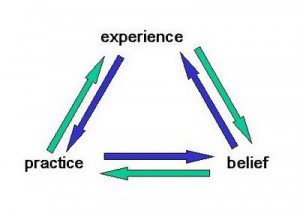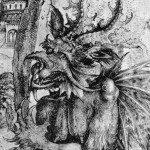 Paganism is known as a religion of orthopraxy, not orthodoxy – what matters most is that you do what’s right, not that you believe what’s right. While the majority culture usually thinks of religion primarily in terms of beliefs, that idea is actually very modern, very Western, and very Protestant. I frequently mention this in terms of caring for the Earth: it doesn’t matter if you care for the Earth because you see it as the body of the Goddess or because you see it as God’s creation or because you see it as the only planet we’ve got. What matters is that you care for the Earth.
Paganism is known as a religion of orthopraxy, not orthodoxy – what matters most is that you do what’s right, not that you believe what’s right. While the majority culture usually thinks of religion primarily in terms of beliefs, that idea is actually very modern, very Western, and very Protestant. I frequently mention this in terms of caring for the Earth: it doesn’t matter if you care for the Earth because you see it as the body of the Goddess or because you see it as God’s creation or because you see it as the only planet we’ve got. What matters is that you care for the Earth.
With this emphasis on action over belief, it is not surprising that the on-line theological discussions of the past few weeks have generated a backlash. In particular, two prominent Pagans have published essays downplaying the importance of belief.
Thorn Coyle has an essay on Huffington Post with the title “Why I Am Not a Believer.” She quotes Feri founder Victor Anderson, who said “perceive first, believe later” and she paraphrases Joseph Campbell: “I don’t need belief because I have experience.” In fairness to Thorn, most of her essay is devoted to holding beliefs lightly and remaining open to new experiences as well as new interpretations. Those are good ideas, but the title and the quotes send a strong message that belief doesn’t matter.
There is no such nuance in Galina Krasskova’s PaganSquare essay titled “We Don’t Need No Stinkin’ Theories.” Here’s a key quote:
As I was discussing this on Facebook, noting that as a result of this debate, I intended to write a series of articles on what I think are the fundamentals of polytheism, Teo Bishop asked me if I would be expanding on the ‘nature of real-ness’ of the Gods in my upcoming articles, if I would be positing a theory, what he (and I believe Halstead also) termed a theory of the ontological nature of the Gods.
The question really left me flabbergasted and I’m glad he asked it. I think it highlights a crucial, very crucial difference between polytheists and Neo-pagans. My theological approach is not based on theory. As a polytheist practicing my ancestral traditions, rooted in deeply engaged experience with the Gods and ancestors, I don’t need theories. They’re rendered irrelevant.
I’m in strong agreement with Galina that engaging with the gods is more important than theorizing about the gods. Again, orthopraxy is more important than orthodoxy. But her dismissal of theory simply doesn’t work for me, and I suspect it isn’t helpful to the average Pagan and/or polytheist.
Galina looks back to a glorious pagan past where “the reality of the Gods would have been taken as a given;” where theories about the gods would have been hardwired into a community.
I grew up in a community like that. Only it wasn’t Pagan or pagan, it was fundamentalist Christian. “God said it, I believe it, that settles it.” The men of the church might argue about the meaning of a particular passage of scripture, but that it was anything other than the inerrant Word of God was not open to debate. The saved were going to heaven, the unsaved (which included just about everyone but conservative low-church Protestants) were going to hell, and only a fool would believe otherwise.
Unexamined axiomatic beliefs didn’t work for me then and they don’t work for me now. I can’t simply take the reality of gods and goddesses as a given. I need a theory, a framework of belief. I don’t need proof, but I do need reason.
And I think most Pagans and would-be Pagans do too.
Religious experience is important. But experience by itself is literally meaningless – it has no meaning until we interpret it, and we interpret our experiences based on our beliefs. Put a Wiccan, a Baptist and an atheist on a beach at sunset. They will feel the same breeze, smell the same smells, gaze at the same horizon and hear the same waves. They will have the same experience, but they will interpret that experience in very different ways based on their beliefs about Nature, the god(s) of Nature, and their place in Nature.
Some people have intimate experiences of the gods that leave no doubts in their hearts and minds. Others – myself included – have experiences that are absolutely real in the moment, but afterwards, doubts begin to creep in. Perhaps my experience wasn’t strong enough. Perhaps I’m too rooted in the mainstream culture. Perhaps the fundamentalist religion of my childhood isn’t as gone as I think it is. Perhaps I’m simply too skeptical.
What are we to do? Are we to ignore the call of the gods? Are we to lie to ourselves and insist our experiences are more than what they really are?
No.
We reinforce our experiences with beliefs. As Thorn says:
We humans are storytellers. Stories apply meaning to our experiences. This is a good thing. There is truth in our stories, as well as exploration, and a connection to the line of past and future.
We draw on the wisdom of others who have had similar experiences, both ancient and contemporary. We compare our experiences to theirs, we compare them to what we know of the Universe and the way it works. We form hypotheses of belief and we test those hypotheses with further practice, and that practice generates further experiences. As our experiences grow, we refine our hypotheses into theories – ideas about who and what the gods are and how we relate to them.
My experiences of the gods I serve may not be as strong as the experiences of some Pagans, but it’s been strong enough to give me a clear sense of direction. And a big part of that direction is introducing the gods to the people. Oh, the gods can speak to whoever they like – but will those people hear them? Or will they dismiss what they hear as fantasies, delusions, and mixed up brain chemistry?
People will only hear what they’re prepared to hear. People will only see what they’re prepared to see.
If I have heard nothing else from the deities I serve, it’s this: “make them ready.”
In order to be ready to hear and see the gods, people must first believe that such things as gods might actually exist and that we can interact with them. That’s a tall order for a culture where the loudest voices on one side scream there is only one god and the loudest voices on the other side scream there are no gods. People need stories, theories and beliefs.
Here’s what I wrote last year:
Belief comes as we try to interpret our experiences. What do they tell us about ourselves and our place in the grand order of things? What do they tell us about our place in the community? What do they tell us about how we should live our lives – what is of ultimate importance and what is trivial? Why did this practice generate this experience?
The meaning we take from our beliefs motivates us to practice deeper and more frequently. More and deeper practice generates more and deeper experiences. More and deeper experiences further reinforce our beliefs.
Practice, experience and belief are a virtuous circle.
I am envious of Pagans whose experience is so strong they don’t need belief. I’m not one of them. So I’ll continue to interpret my experiences and tell my stories. I’ll continue to discuss my theories with other Pagans. I’ll continue to refine those theories, trying to understand the gods intellectually as well as spiritually. I’ll do my best to avoid getting so caught up in thinking that I forget doing. Right action is still more important than right belief.
But I need belief. And I think most people do too.
















